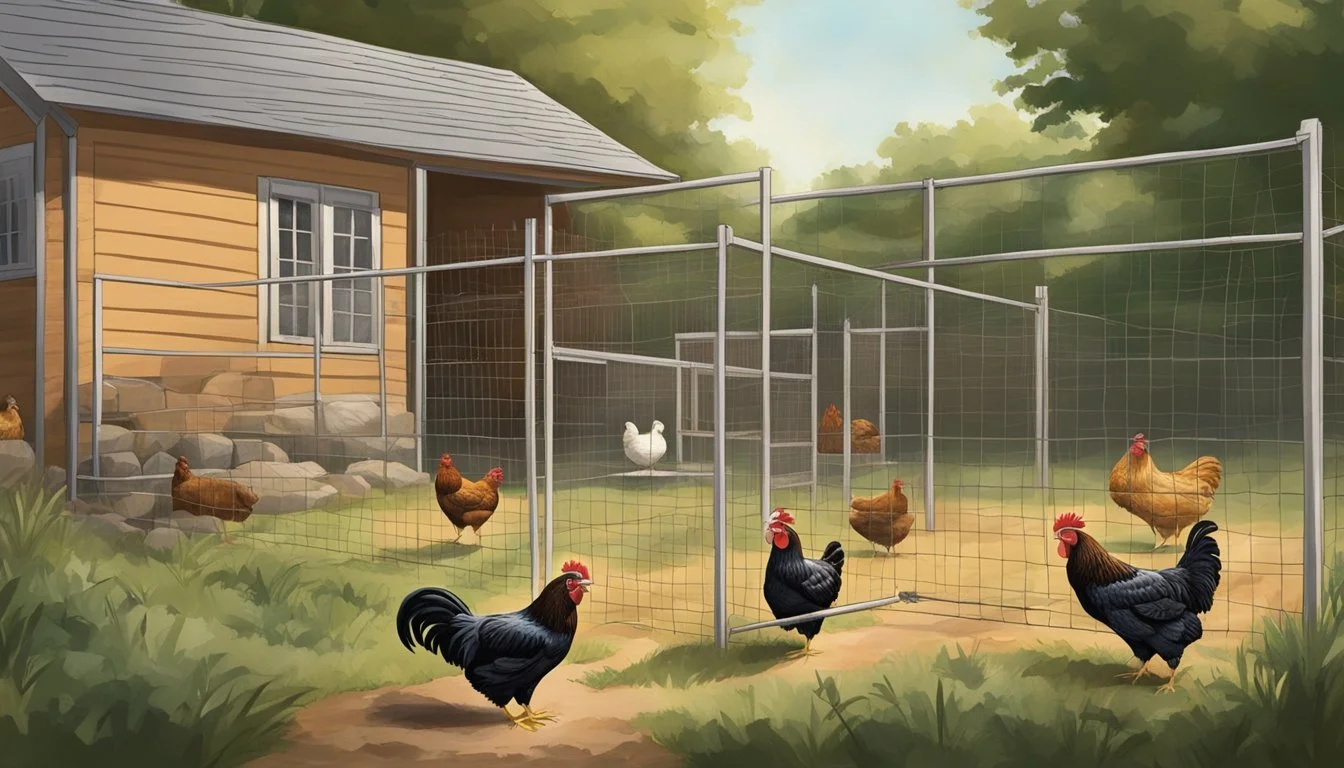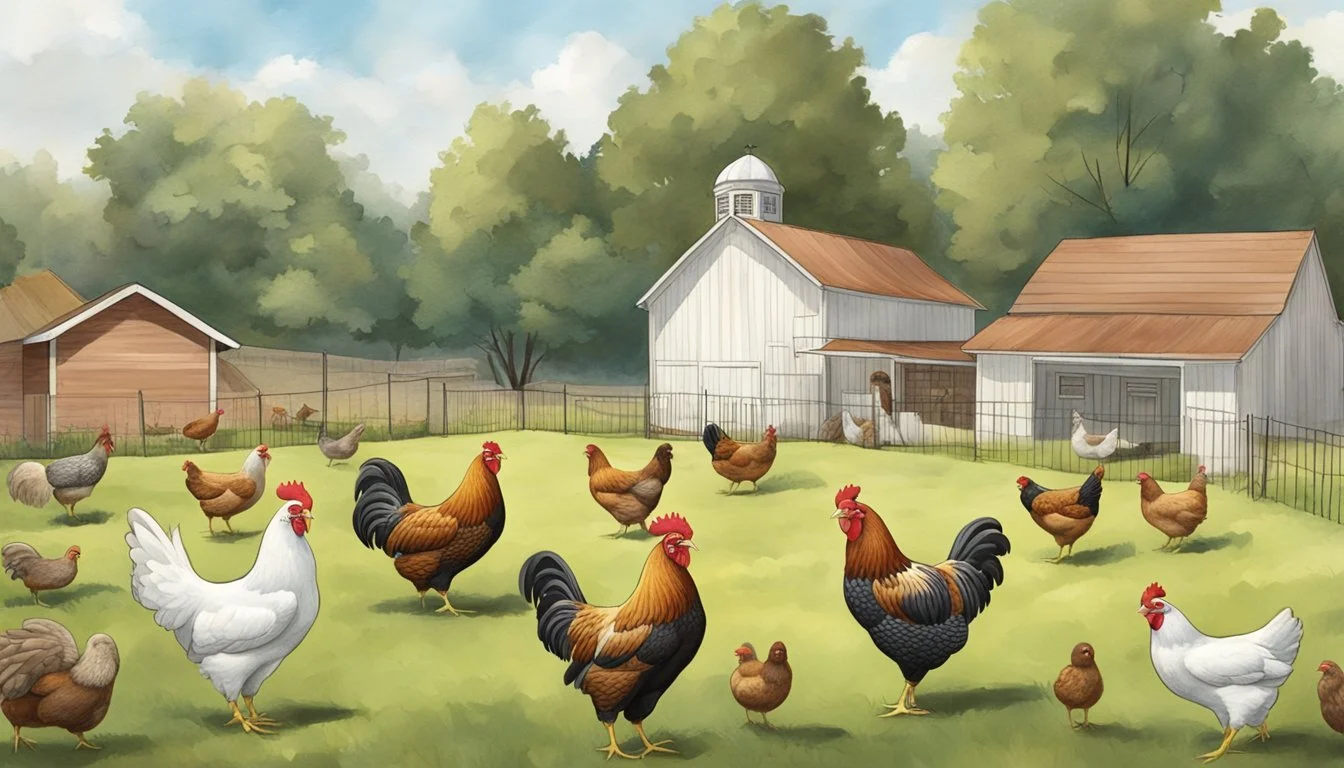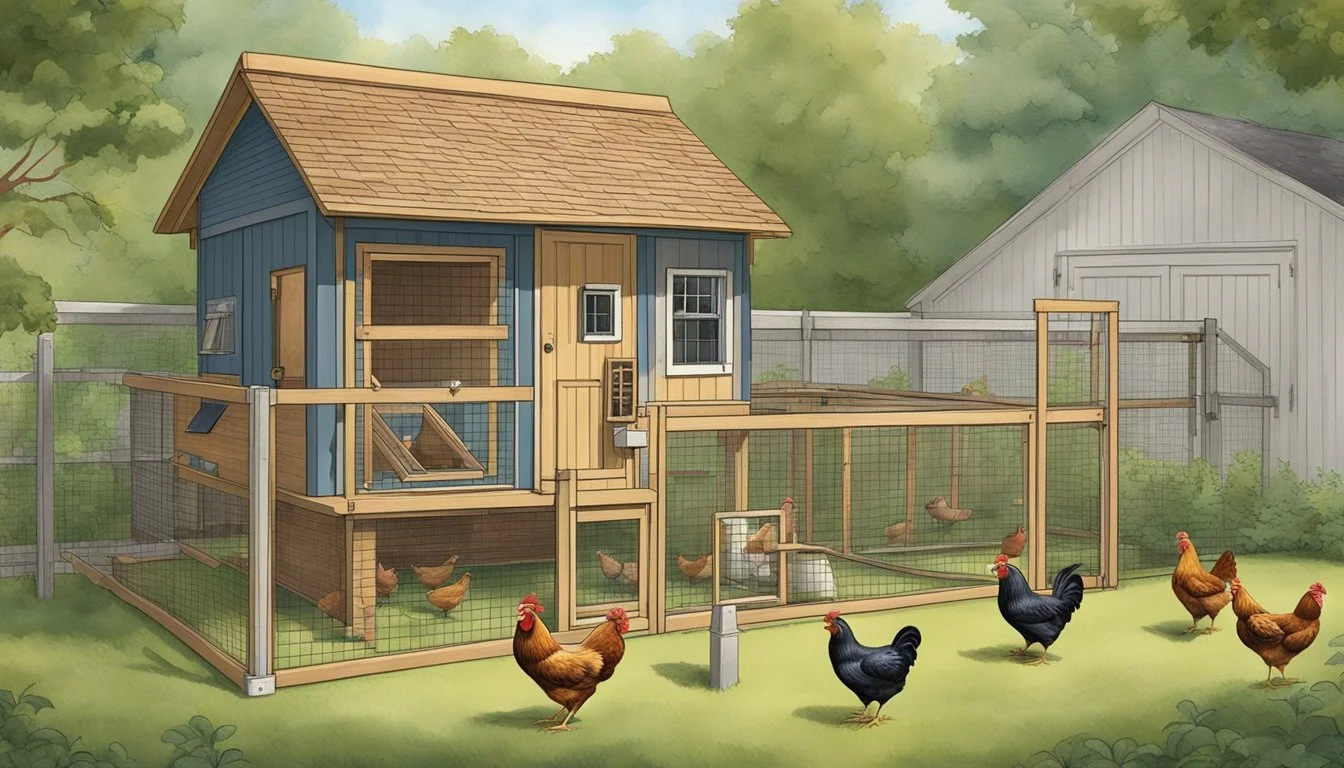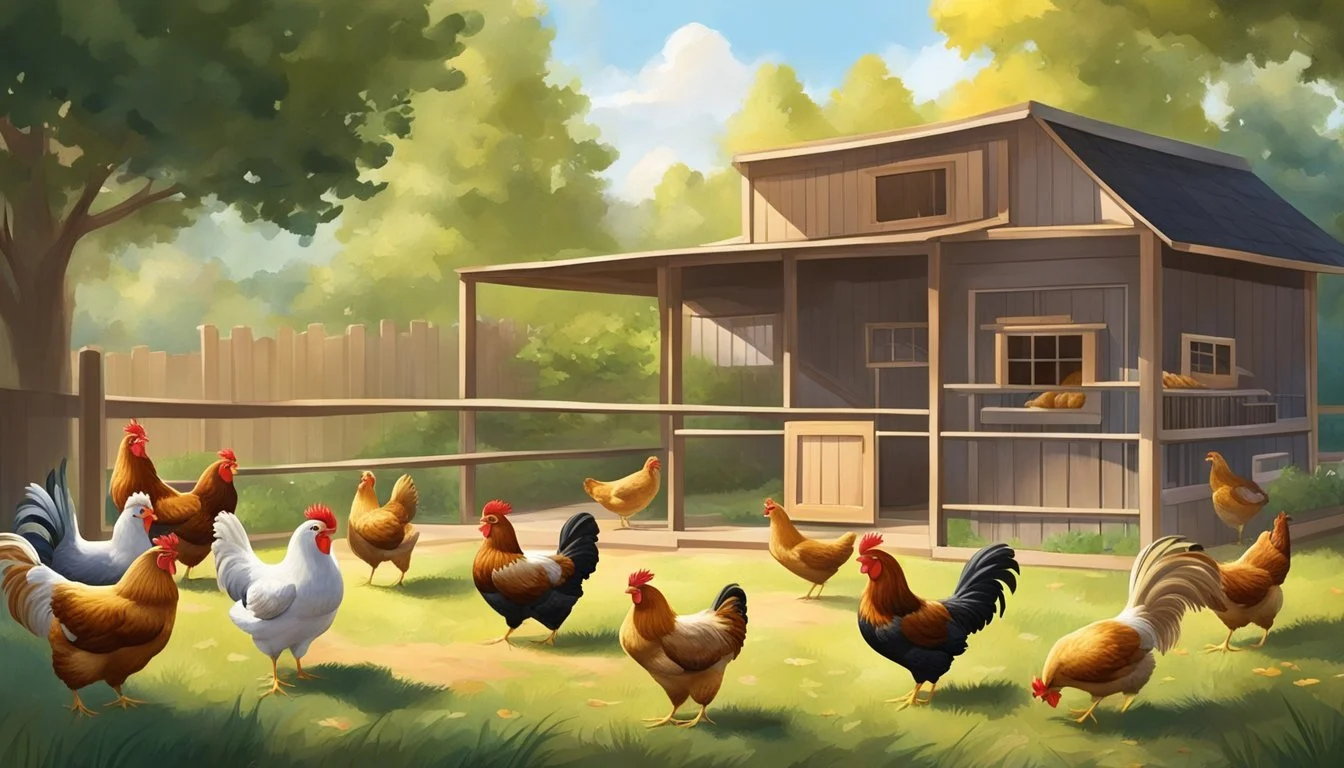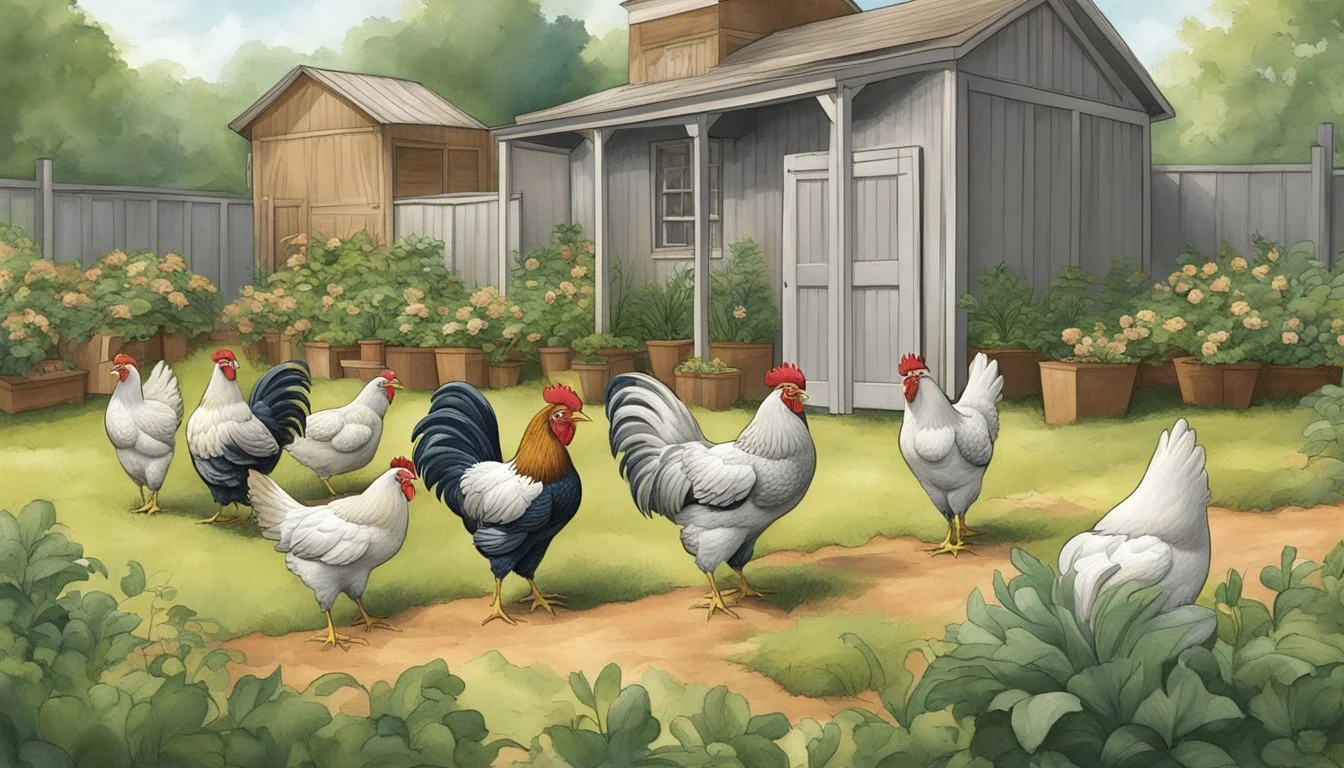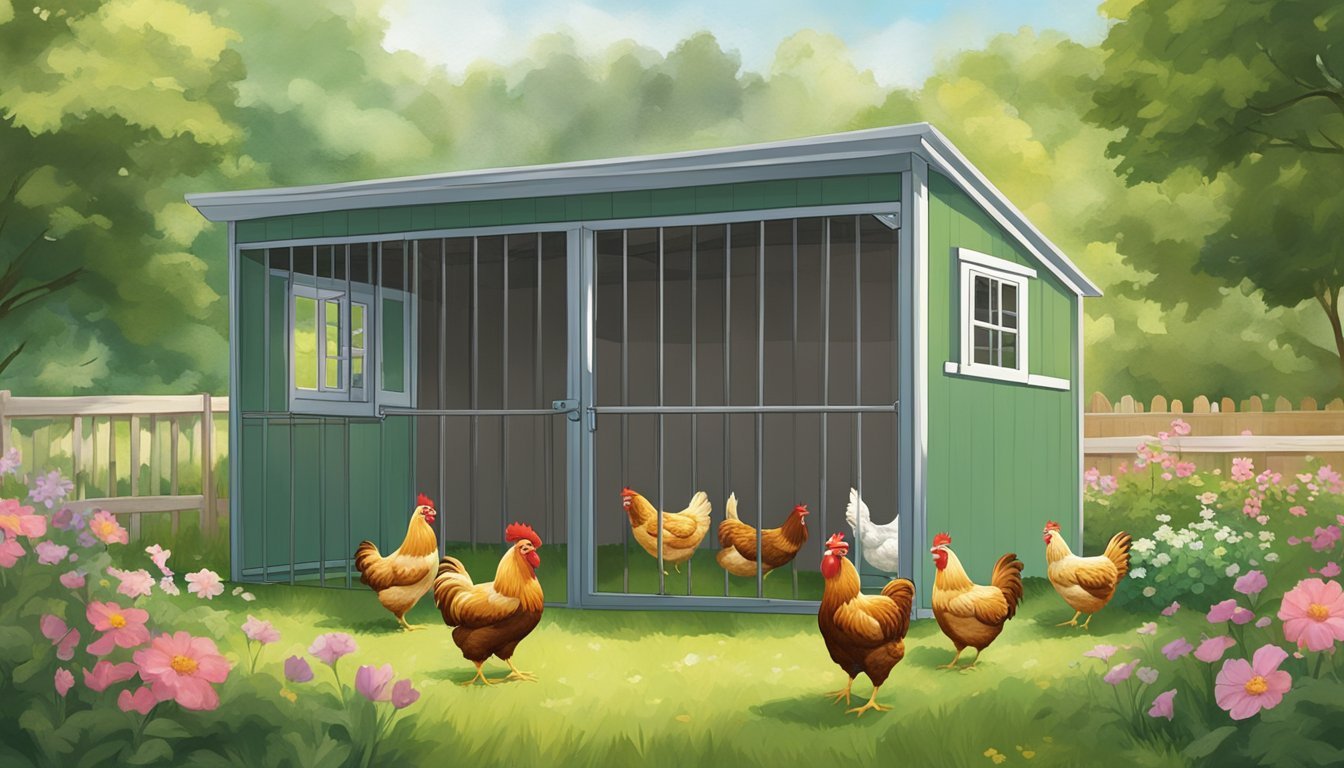Raising Backyard Chickens in Florence, AL
Essential Tips for Beginners
Raising backyard chickens in Florence, Alabama, has become an increasingly popular endeavor for residents looking for a rewarding hobby that offers both fresh eggs and the joy of caring for animals. The practice is not only a sustainable way to produce food but also provides valuable learning experiences in animal husbandry and local ecosystem management. It’s important for potential chicken keepers to know that while Florence allows the raising of hens, the city has specific regulations designed to maintain harmony within residential areas. These regulations include limits on the number of chickens based on property size and a ban on roosters, which are known for their disruptive crowing.
In Florence, those with properties less than 10,000 square feet are permitted to keep up to six hens, ensuring that the impact on neighbors is minimal. This limitation is a careful balance between allowing residents the pleasures of backyard chicken raising and keeping the noise and maintenance concerns in check. As with any form of animal rearing, there’s a learning curve involved. Prospective chicken owners must understand the responsibilities that come with poultry care, including providing proper shelter, ensuring adequate nutrition, and safeguarding the flock’s health and well-being.
Moreover, raising chickens in Florence's climate means there may be more considerations to address, including preparing for fluctuating weather conditions. It’s imperative for chicken enthusiasts to select breeds that can tolerate the region’s temperature ranges, ensuring their flock can thrive year-round. Knowledgeable keepers understand the importance of cold-hardy breeds in the colder pockets of North Alabama. Adapting to the local climate is crucial for a successful backyard chicken operation in the city of Florence.
Understanding Local Chicken Laws
In Florence, Alabama, residents interested in backyard chicken keeping are subject to specific local ordinances within the municipal code. These regulations are designed to ensure the harmonious keeping of chickens in residential areas and uphold community standards.
Navigating Florence and Alabama Ordinances
In the city of Florence, municipal ordinances stipulate that only hens are permitted within residential areas; roosters are banned due to their propensity to create noise. The number of allowed hens is contingent on the property size. For properties less than 10,000 square feet, the city imposes a maximum limit of six hens. Residents are advised to consult the city's code for any additional constraints which may include shelter specifications and distance requirements from neighboring homes.
Compliance with City and County Regulations
Across the state of Alabama, chicken keeping regulations are not uniform and can vary significantly between jurisdictions. It is crucial for prospective and current chicken keepers to verify their local city and county regulations. While some counties may have lenient policies towards poultry, others can be restrictive. This necessitates a thorough review of both Florence and wider Alabama chicken ordinances, to ensure full compliance with local laws for raising chickens. In some cases, individuals committed to chicken keeping may benefit from civic engagement, potentially collaborating to propose modifications to the existing legal framework where necessary.
Choosing the Right Chicken Breed
When raising chickens in Florence, Alabama, selecting the appropriate breed for your backyard is crucial to ensure your flock thrives in the local climate and meets your specific needs.
Factors in Selecting Breeds
Climate Considerations: The climate in Florence, AL can experience cooler temperatures, making it essential to choose breeds that can withstand colder weather. Cold-hardy chickens such as the Rhode Island Reds and Plymouth Rocks are equipped with the necessary traits to thrive in varying temperatures.
Purpose: Deciding between egg-laying, meat production, or dual-purpose breeds influences one's choice. For example, Leghorns are excellent layers, known for their prolific egg production, while dual-purpose breeds like Sussex offer both substantial egg-laying capabilities and meat.
Space Needs: Backyard space dictates the size and number of chickens one can comfortably raise. Bantam breeds are suitable for smaller spaces, whereas larger breeds require more room to roam.
Temperament: A breed's temperament is an important consideration, especially for families with children. Docile breeds, such as Orpingtons, are known for their friendly nature.
Exploring Popular Chicken Breeds
For Cold Climates:
Rhode Island Reds: Robust and versatile, they are excellent layers of brown eggs.
Plymouth Rocks: These chickens are winter-hardy and good-natured.
For Egg-Laying:
Leghorn: Renowned for laying up to 280 white eggs annually, they are a top choice for dedicated egg production.
Sussex: They lay on average 200 brown eggs per year and adapt well to cooler climates.
Dual-Purpose Breeds:
Sussex: Not only good for egg-laying but also provide a reasonable amount of meat.
Plymouth Rocks: They have a calm demeanor and provide both eggs and meat, making them a practical option for backyard flocks.
Setting Up Your Chicken Coop
Setting up a chicken coop in Florence, Alabama, requires careful attention to space, structure, and safety. A well-crafted coop provides a secure and comfortable home for backyard chickens, ensuring they have the space to engage in natural behaviors.
Essential Coop Features
Size: Each chicken requires a minimum of 2-3 square feet of space inside the coop and 8-10 square feet in an outside area for roaming.
Nesting Boxes: Provide at least one nesting box for every three hens, placing them in a dark and quiet area of the coop.
Ventilation: Proper ventilation is critical to prevent moisture buildup and maintain air quality, but it should not cause direct drafts on the birds.
Coop Construction and Upgrade Tips
Materials: Use durable materials that insulate well and are easy to clean.
Accessibility: Design the coop with doors or panels that allow easy access for cleaning and egg collection.
Lighting: Natural light is important; however, windows must be covered with predator-proof wire.
Upgrades: As your flock grows, consider expanding the coop size or adding additional nesting boxes and perches to accommodate more chickens.
Protection Against Predators
Secure Fencing: Surround the coop with sturdy fencing that extends underground to prevent digging by predators.
Locks: Equip doors and access points with secure locks to keep out animals like raccoons, which can open simple latches.
Regular Checks: Inspect the coop and run regularly for vulnerabilities where predators might gain entry.
Maintaining a Healthy Flock
Ensuring a healthy backyard chicken flock in Florence, AL, hinges on consistent daily care, a balanced diet, and vigilant observation for signs of illness. Through a stable routine and preventative measures, flock owners can foster an environment conducive to their chickens' wellbeing.
Daily Care and Feeding Routines
Daily Checks:
Inspect each chicken for signs of distress, injury, or abnormalities.
Confirm the integrity and security of the coop to protect from predators.
Feeding:
Provide a complete feed formulated for the respective life stage of your chickens.
Schedule feedings twice a day to keep chickens nourished and maintain routine.
Water:
Refill water containers with fresh water multiple times a day.
Clean water dispensers regularly to prevent algae and bacterial growth.
Cleanliness:
Remove manure from the coop daily to maintain hygiene.
Replace bedding as needed to ensure a dry and clean environment.
Coop Maintenance:
Schedule periodical deep cleanings of the entire coop to manage pest populations and eliminate disease risks.
Preventing and Treating Common Illnesses
Prevention:
Administer recommended vaccinations and treatments to prevent common illnesses.
Implement biosecurity measures, such as sanitization of equipment and limiting visitor access to the flock.
Common Health Issues:
Respiratory infections: Characterized by coughing, sneezing, and labored breathing.
Parasitic infections: Look out for mites, lice, and internal worms that can affect chicken health.
Treatment:
Consult a veterinarian immediately upon noticing symptoms of illness.
Isolate affected birds to prevent the spread of disease to the rest of the flock.
Pest Control:
Use predator-proof fencing around the coop.
Rotate pasture areas to break pest and parasite life cycles.
By adhering to these meticulous routines and measures, owners can effectively safeguard the health of their backyard chickens, ensuring a flourishing and productive flock.
Maximizing Egg Production
To ensure a robust egg yield from backyard chickens in Florence, AL, one needs to consider their dietary needs and the environmental factors that can affect their laying patterns.
Nutritional Requirements for Laying Hens
Proper nutrition is vital for laying hens to produce a steady supply of fresh eggs. A balanced diet must include:
Proteins: Crucial for egg production; should constitute about 16-18% of their diet.
Calcium: Essential for shell strength, provided through oyster shells or calcium supplements.
Grit: Helps with digestion, which is necessary for nutrient absorption.
Here's a basic guideline for a laying hen's diet in Florence:
Nutrient Importance Source Protein Vital for egg production and overall health Layer pellets, fish meal, insects Calcium Needed for strong eggshells Oyster shell, eggshell, commercial mix Grit Assists in digestion Sand, small pebbles, commercial grit Vitamins & Minerals Promote health and enhance laying capabilities Vegetables, fruits, fortified feeds
Consistent access to fresh water is non-negotiable for hens to maintain egg production.
Environmental Factors Influencing Egg Laying
The environment in which chickens live can significantly influence their ability to lay eggs:
Lighting: Aim for 14-16 hours of light per day to stimulate egg production. This can be achieved by using supplemental lighting during shorter days.
Temperature: A stable temperature in the coop, avoiding extremes, supports consistent
Enhancing Chicken Welfare
To ensure the well-being of backyard chickens in Florence, Alabama, owners should implement strategies for environmental enrichment and climate control. These measures are designed to promote natural behaviors and protect chickens from weather extremes.
Physical and Behavioral Enrichment
Backyard chickens thrive with access to physical and behavioral enrichment. Coop lighting should mimic natural sunrise and sunset to support the chickens' circadian rhythms. It's recommended to use timers to automate the lighting schedule, ensuring consistency. Additionally, the provision of toys for chickens, such as mirrors, perches, and pecking blocks, encourages exercise and mental stimulation, both essential for their well-being.
Chickens also benefit from outdoor runs, where they can forage, dust-bathe, and explore. A secure environment with automatic coop doors not only affords more daylight exposure but also protects against predators, offering safety alongside fun. Coop doors that open and close automatically can help regulate the birds' exposure to the outside, allowing them free range during optimal times.
Managing Climate Extremes in Florence
In Florence, coping with climate extremes means keeping chickens both warm in winter and cool during hot months. Proper coop heating solutions, such as infrared lamps spaced safely away from flammable materials, can provide warmth without overheating. It's important to monitor the temperature to maintain a cozy, not hot, environment.
Conversely, to keep chickens cool, adequate ventilation is key. Owners should ensure that the coop allows for sufficient air flow, yet is free from drafts. During particularly hot periods, additional cooling methods like fans or misting systems can be employed to reduce heat stress.
Season Enrichment Strategy Purpose
Managing a Backyard Flock
Successfully managing a backyard flock in Florence, AL, involves understanding local regulations, bird behavior, and community relations. This section provides essential information on responsible chicken ownership and strategies for managing common flock behaviors.
Responsible Ownership and Community Relations
In Florence, AL, one must ensure local ordinances are followed to legally keep backyard chickens. Chickens provide companionship and a source of fresh eggs, yet they also require responsibility. They should be kept in clean, secure coops, provided with fresh water and proper feed, and protected from predators. Building good relations with neighbors also involves maintaining cleanliness to prevent odors and keeping noise levels, such as those from roosters, to a minimum. One may consider discussing their chicken raising activities with their neighbors to avoid any issues and promote understanding.
Keep the coop clean and comply with local zoning laws.
Provide nutritious food and fresh water daily.
Limit noise and address any concerns raised by neighbors.
Dealing with Hatching, Pecking, and Other Behaviors
Chickens exhibit natural behaviors such as pecking, which is a way for them to explore their environment and establish a pecking order. However, excessive pecking can lead to aggression and injury. To minimize issues, provide adequate space, and introduce environmental enrichments such as perches and dust bathing areas. In some cases, applying an anti-pecking spray can help deter harmful pecking. Monitoring flock dynamics is crucial, particularly if introducing new birds or managing the hatching of eggs.
Monitor and manage the pecking order to prevent bullying.
Provide environmental enrichment to reduce stress and boredom.
Consider anti-pecking measures if behaviors escalate.
Advanced Topics in Backyard Poultry
Exploring the more complex aspects of backyard poultry goes beyond basic care, encompassing breeding strategies, chick management, and the implementation of high-tech tools to elevate the practice of raising chickens to new heights.
Breeding and Raising Chicks
The process of breeding and raising chicks requires careful planning and an understanding of genetics. Poultry farmers must select breeding pairs that will result in offspring with desired traits, such as improved egg production or disease resistance. A reliable hatchery is critical to obtain quality eggs for hatching. Incubators must maintain optimal temperature and humidity for successful hatching. Once chicks are born, they need special attention, including proper heat lamps to maintain their body temperature in their early life stages.
Selection Process: Identifying traits, choosing suitable breeding pairs.
Hatchery Role: Sourcing eggs, ensuring genetic diversity.
Temperature: Typically 99.5°F (37.5°C)
Humidity: Approximately 50-65%, increasing in the final days of incubation.
Post-Hatching Care:
Monitor chick development closely.
Utilize heat lamps or warming plates to ensure chicks remain warm.
Gradually integrate chicks into existing flock while monitoring for behavior and health.
Integrating Advanced Equipment and Techniques
Advances in technology have provided poultry farmers with an array of equipment designed to streamline care and management of chickens. Coop deodorizers can assist in maintaining a clean and pleasant environment, reducing the likelihood of disease. Chicken pluckers can save time during processing. For those who venture into digitization, coop cameras have become an essential tool for remote monitoring, ensuring the safety and well-being of the flock.
Coop Deodorizers: Essential for odor control and sanitary conditions.
Chicken Pluckers: Time-saving during butchering.
Coop Cameras: Confers the ability to observe the flock remotely and respond promptly to any issues.
List of Advanced Techniques and Tools:
Automated feeders and waterers to minimize waste.
Egg incubators with precise control features.
Environmental controls within the coop for temperature and humidity regulation.
Predation deterrent systems, like motion-activated lighting or fences.
Farmers must research and decide judiciously when integrating such equipment, considering factors like budget, flock size, and specific needs of their poultry.
Additional Resources for Rearing Chickens
When starting or maintaining a flock of backyard chickens in Florence, Alabama, reliable resources are essential for obtaining accurate information and support. The right guides and community networks can be invaluable for both novice and experienced chicken owners.
Finding Information and Support in Florence
For residents of Florence, AL, who are interested in rearing chickens, there are several local resources available. Individuals can research town and county regulations regarding backyard flocks. Contacting local agriculture extension offices can also yield a wealth of information and advice on best practices for chicken care.
Local Government Offices: Provide details on allowable chicken breeds, coop specifications, and other regulations.
Agriculture Extension: Offers research-based guidance, workshops, and potentially direct advice from avian specialists.
Residents should consider attending city council meetings to stay updated on any changes to local laws that affect their fowl-keeping abilities.
Utilizing Online Forums and Local Community Networks
For broader support, online forums such as BackYard Chickens offer a platform where members from around the world, including those in Florence, can engage in discussions, ask questions, and share experiences.
Online Forums: Users can become a thread starter or contribute to existing discussions for specific advice.
Local Community Networks: Often found through forums or social media, these networks serve as a space for local chicken enthusiasts to share tips and coordinate events.
It is recommended to check the credibility of the information and to validate it against multiple sources before applying any new techniques to one's own chicken-rearing practices.
Conclusion
Backyard chicken keeping in Florence, Alabama, offers several benefits. Individuals find pleasure in maintaining a small flock, often citing the personal connection with their birds and the enjoyment of fresh eggs. The practice can be a rewarding endeavor for garden enthusiasts seeking organic pest control and rich fertilizer.
For novices and beginners, starting with adult birds might be more manageable. They require less intensive care than chicks and typically start laying eggs sooner. However, one should note that going on vacation may require arranging reliable care for the flock.
Those considering chickens as part of their gardening plan should be aware of the commitment. Chickens need daily attention, and the coop requires regular cleaning to maintain a healthy environment. It is essential to have a robust plan in place for both daily care and times away from home.
Here's a brief overview of key considerations for prospective chicken keepers in Florence, AL:
Bird Limit: Up to six hens permitted on smaller lots, no roosters allowed.
Coop Requirements: Coop size and features may vary based on property size.
Maintenance: Routine cleaning and daily feeding is required.
Vacation Planning: Provision for bird care during absences is necessary.
Embracing backyard chicken keeping can be a highly positive experience with proper preparation and adherence to local regulations. Those in Florence, Alabama, can partake in this pursuit with confidence, equipped with knowledge and a clear understanding of the responsibilities involved.


